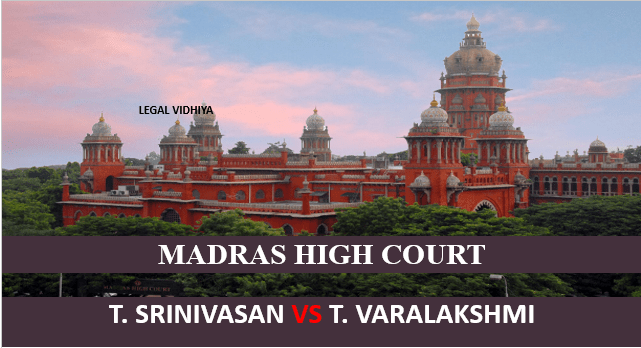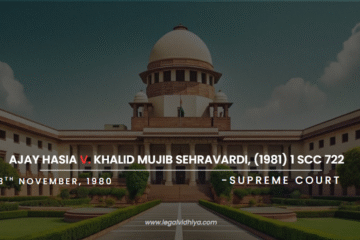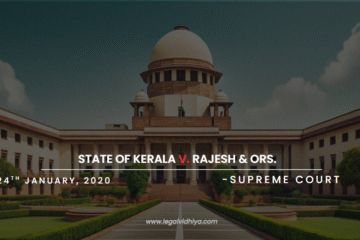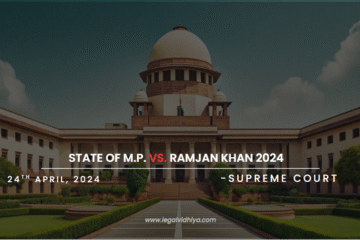
| CITATION | I (1991) DMC 20 |
| DATE OF JUDGEMENT | JAN 22, 1998 |
| COURT | MADRAS HIGH COURT |
| APPELLANT | T. SRINIVASAN |
| RESPONDENT | T. VARALAKSHMI (MRS.) |
| BENCH | J. K.M. NATARAJAN |
INTRODUCTION-
The T Srinivasan vs. T Varalakshmi Case clarified the meaning of the word ‘wrong‘ as defined in Section 23(1)(a) of the Hindu Marriage Act, as well as the Restitution of Conjugal Rights. The Srinivasan v. Varalaxmi case held that in order to be a ‘wrong’ within the meaning of Section 23(1)(a) of the Hindu Marriage Act, the alleged conduct must be more than a simple refusal to accept an offer of reunion; it must be misconduct serious enough to justify denial of the relief to which the husband or wife is otherwise entitled.
FACTS OF THE CASE-
- The respondent-wife filed a separate maintenance suit against the appellant in O.S. No. 9654 of 1977 before the V Assistant Judge.
- Their marriage ceremony took place on 31 January 1975 in Madras, and their marriage was consummated on 2 February 1975. After 2 or 3 days in the respondent’s place, the appellant took her to his parent’s house. Following that, he began teasing her about her parents’ lack of gifts and the presence of a small congenital lump on the respondent’s shoulder. Even though he was aware of it prior to marriage, he dismissed it as insignificant.
- The appellant-husband ordered the respondent-wife to leave the house and return with larger gifts and jewels. The appellant then served the respondent with a notice alleging that she had left the house on her own accord, to which she responded by denying the allegations and stating that she had been deserted by the appellant and was eager to rejoin the appellant.
- The appellant responded with a rejoinder. He then filed a petition for restitution of conjugal rights in O.P. No. 430 of 1975.The appellant issued a rejoinder. Thereupon, he filed a petition for restitution of conjugal rights in O.P. No. 430 of 1975.
- On the basis of the averments made in the respondent’s counter-petition, the court granted the petition and issued a decree for the restitution of conjugal rights. Following that, the respondent’s wife informed the appellant through her counsel that she was willing to join with the appellant and lead a conjugal life with him, and she requested that he send someone to take her back to his house. The respondent did not provide a response.
- The appellant and his mother did not permit the respondent to enter the appellant’s home when she visited. She then sent out a notice outlining the circumstances and the appellant’s rejection to accept her return.
- The respondent then filed a complaint with the Elephant Gate Police Station. The appellant stated in writing at the police station that he refused to take her back to his house. As a result, she filed a maintenance claim under Section 18 of the Hindu Adoptions and Maintenance Act.
- The appellant opposed the suit, and in his written statement, he admitted the marriage and claimed that the respondent and her parents deceived him by failing to disclose a large lump on the respondent’s back, which he discovered only on the wedding night.
- The respondent’s allegations about the inadequacy of gifts were denied by the appellant.
- As a result, the appellant-husband filed a divorce petition under section 13(1A)(ii) of the Hindu Marriage Act, 1955 on the grounds that, despite receiving a decree for restitution of conjugal rights, the parties had not lived together and no restitution had occurred between them for more than a year after the decree.
- Furthermore, the respondent-wife resisted the aforementioned application by claiming that it is only the appellant who abandoned her without reasonable or probable cause that all attempts by her to live with him after the restitution decree have been futile, and that he is not entitled to a divorce decree.
ISSUES RAISED-
- Whether the relevant court has successfully applied the principle stated in section 13(1A) of the Hindu Marriage Act, 1955?
- Whether a decree for divorce be issued automatically after the one-year window following the date of the decree for restitution of conjugal rights expires?
- Whether the Hindu Marriage Act, 1955’s Section 23(1) supported the lower court’s decision to deny the appellant a divorce decree?
- Whether the appellant still have the right to file for divorce under the Hindu Marriage Act, and whether the plaintiff is still eligible for maintenance payments?
- Whether the respondent is eligible for an additional form of maintenance?
RATIO:
- The appellant’s legal representative argued that while Section 13(1A)(ii) of the Hindu Marriage Act, 1955 is influenced by Section 23(1)(a), the mere act of the appellant refusing to reconcile with the respondent should not be considered as a ‘wrong.’ This refusal should not disqualify them from obtaining a divorce decree.
- As a result, the court handling the case did not accept the argument that the appellant’s refusal to reunite with the respondent could be a valid reason to deny the divorce decree, especially since a year had passed since the initial decree, and this refusal did not constitute the type of wrongdoing specified in Section 23(1)(a). [Case Reference: Dharmendra Kumar v. Usha Kumar; Bimla Devi v. Sing Raj]
- To qualify as a ‘wrong’ under Section 23(1)(a) of the Hindu Marriage Act, the alleged behaviour must go beyond a simple unwillingness to agree to a reunion; it must be serious misconduct justifying the denial of the relief that the husband or wife would otherwise be entitled to.
- It’s also important to note that the divorce petition under Section 13(1)(A) of the Hindu Marriage Act, 1955 was filed while maintenance proceedings initiated by the respondent-wife were ongoing. Additionally, this petition was filed long after the commencement of those proceedings, during which it was claimed that the appellant wilfully neglected to provide for her and abandoned her without a reasonable cause, despite repeated requests and notices.
- The appellant’s behaviour in these circumstances is relevant in determining the concept of ‘wrong’ as outlined in Section 23(1)(a) of the Act. Therefore, it’s not just a matter of non-compliance with the decree, but rather an affirmative wrongful act by the appellant, and according to Section 23(1)(a), they are not entitled to the relief specified in Section 13(1-A).
JUDGEMENT (DECISION) -:
The courts below have found that the husband obtained a decree for the restitution of conjugal rights not with the intention to comply with it but, conversely, to deprive his wife of her right to fulfil her marital duties. The wife requested the husband to allow her to rejoin him, but he refused to permit her entry into their home and even expelled her and her relatives who attempted to assist her. These actions by the husband constitute significant wrongdoing, falling within the definition of “misconduct” as outlined in Section 23(1)(a) of the Hindu Marriage Act, 1955, which cannot be condoned. Consequently, he was rightly denied relief under Section 13(1-A) of the same Act. Thus, the appeals are unsuccessful and are hereby dismissed.
The respondent’s counsel has informed us that a sum of Rs. 3000 has been deposited with the Registry to cover the costs of these appeals. The counsel requests that this amount be disbursed directly to the wife-respondent by the Registry. This request is granted and should be executed accordingly.
CONCLUSION:
In conclusion, the judgment cited above highlights the significance of Section 23(1)(a) of the Hindu Marriage Act, 1955, in cases involving marital disputes. The decision underscores that obtaining a decree for the restitution of conjugal rights with the intent to prevent the other spouse from exercising their marital duties constitutes misconduct and qualifies as a “wrong” under this legal provision. The judgment emphasizes that such actions are uncondemnable and may result in the denial of relief under Section 13(1-A) of the same Act. This case serves as a reminder of the legal principles governing marital matters and the importance of upholding the rights and duties of both spouses. It underscores the need for courts to scrutinize the intentions and conduct of parties involved in marital disputes to ensure that justice is served.
REFERENCES-
- https://indiankanoon.org/
- https://lawplanet.in/
- https://courtverdict.com/supreme-court-of-india/t-srinivasan-vs-t-varalakshmi-mrs
This Article is written by Aastha Srivastava, a 3rd Year LL.B student of DES Shri Navalmal Firodia Law College, Pune; Intern at Legal Vidhiya.




0 Comments